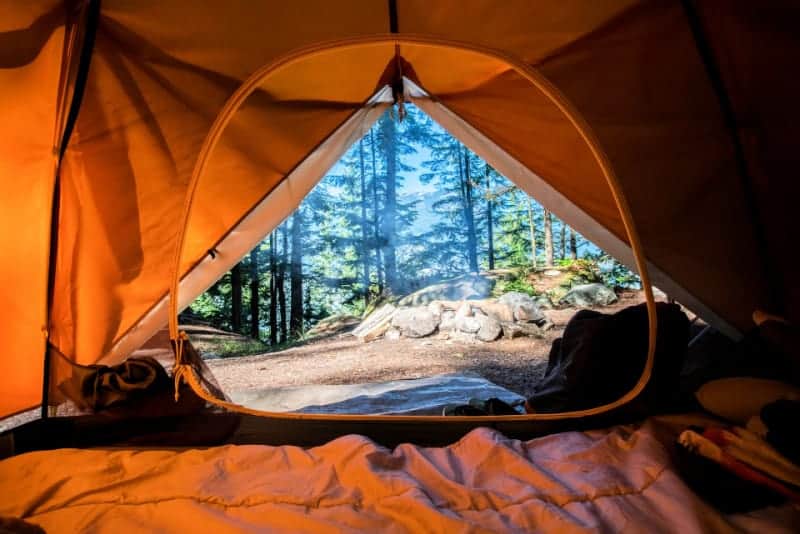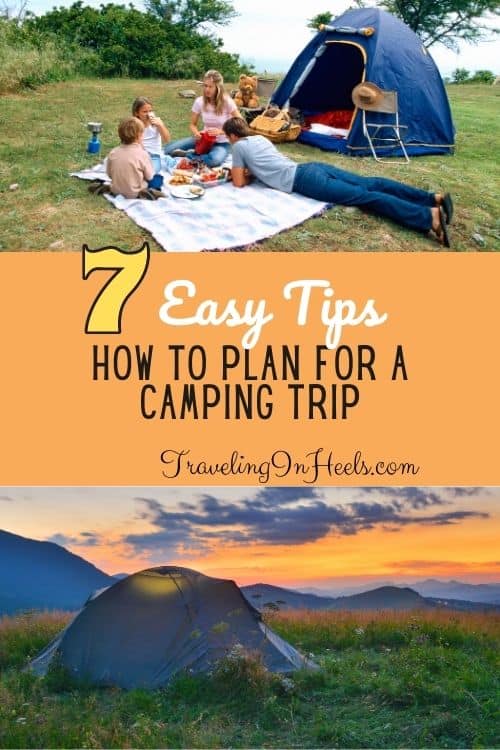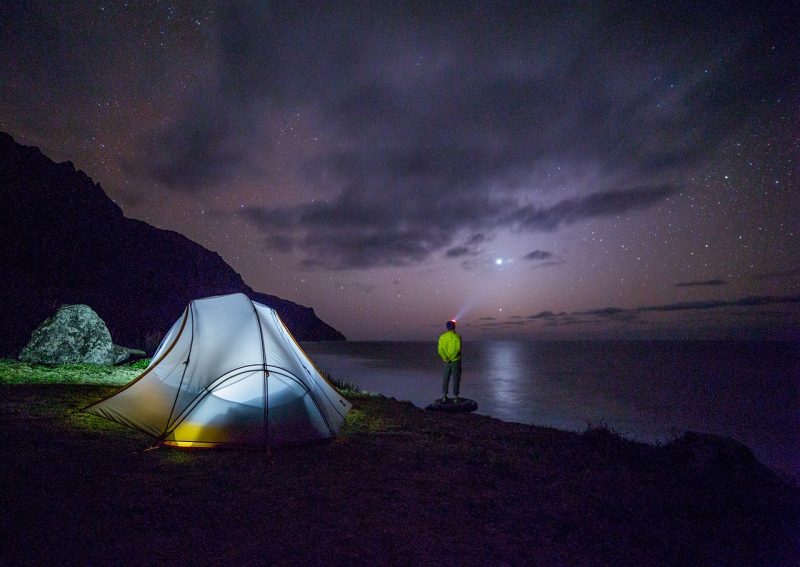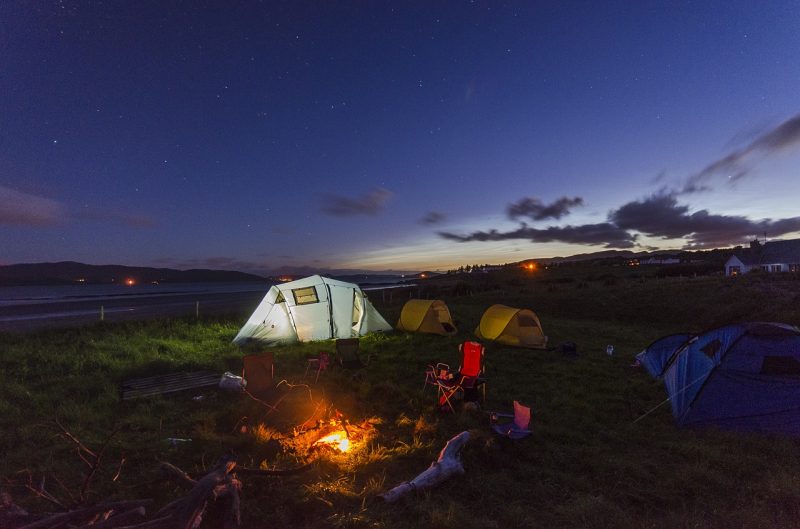Let’s address the elephant in the travel room. This year is different. We may not be jetting off to fulfill bucket list ideas, but we still want to travel. Camping is one way to get your travel fix and continue to adhere to local restrictions. Whether a seasoned or first-time camper, read on for our 7 easy steps on how to plan for a camping trip.

This post contains affiliate links. If you click through and buy, we may receive a commission. Thanks for helping to support TravelingInHeels.
How to Plan for a Camping Trip
Table of Contents
With the ongoing effects of COVID-19, leisure travel has taken the hit, but camping is on the rise as some states have released restrictions, encouraging local travel, according to the Fall 2020 North American Camping Report, an independent study by Kampgrounds of America Inc. The report also notes that many campers actually embarked on their first camping trip in 2020.
At the end of 2019, according to the same annual independent study, more than 7.2 million households in the U.S. started camping over the past five years, revealing that U.S. camping households increased to a new high of 78.8 million.
When searching for affordable vacation ideas, you can’t go wrong with camping. In 2016, 47% of those who went camping in the United States spent just $51-$200 on camping essentials.
And Americans also can choose from some of the most beautiful camping spots in the world.
Read on as we offer 7 easy steps to learn how to plan for a camping trip in 7 easy steps. As you’ll see, the key to a good camping trip is preparation.
FIRST! Select Your Camping Site

Camping is all about selecting the right location. The great thing about living in the United States is that there is plenty of camping destinations.
If you want to explore ocean-carved cliffs, consider the Pacific coastline.
Or maybe, thick forests are more your thing? In that case, you could camp in the area around New England.
While your instinct might be to travel halfway across the country, don’t rule out local campsites. You might just be surprised at what’s available in your local area — and the bonus is less time on the road and more time at your destination.
When choosing somewhere to camp, consider your camping experience.
First-time campers probably want to avoid camping in a swampy Floridian climate. Or the high altitude mountain destinations.
Choose When You’ll Be Camping

When planning a camping trip, pick the right time of year. Since camping is an outdoor activity, the weather can have a huge impact on the experience.
Make sure you take the time to research the climate of the area you plan to camp in.
Camping in the wrong place at the wrong time is likely to ruin your trip. Or worse yet, it could actually be dangerous.
For example, camping in the Death Valley area, where temperatures can easily reach 100 degrees during the wrong season, could be a fatal mistake.
Don’t make any assumptions about what the climate in an area will be like at a particular time of year. Take the time to research the average temperature and rainfall so you can plan accordingly.
The time of year can also determine what you bring with you. In good weather, you might consider getting a hammock. You can learn more about the different kinds of hammocks online.
Choose Your Activities
The key to planning a camping trip is to prepare all of your activities ahead of time.
Camping is all about preparation, so what you bring with you to the campsite will depend heavily on the kind of activities you’ll be doing.
If you plan on lots of hiking, bring multiple pairs of good hiking boots.
On the other hand, if you plan to spend most of your time relaxing around the campsite, this may not be needed.
Some activities may need to be booked in advance, so it makes sense to do your research ahead of time to avoid disappointment.
Also, doing your research into the campsite will give you an insight into what kind of activities are possible there. For example, if there’s a lake, don’t forget to bring your fishing pole!
Get Good Directions
Nothing puts a dampener on a good camping trip like messing up the directions. This means that good directions to the campsite are one of the most critical camping essentials.
One classic mistake that people make is relying on their phones for the route. This may be a sound idea in the city, but out in the sticks, you’re likely to lose your phone signal.
While it’s likely that your phone will function for the whole trip, you shouldn’t rely on it. Consider having backup directions in the form of printed pages. You should also make sure you have a good roadmap in the car.
Make sure to also do some research about any potential sources of delay. For example, look into potential roadworks along the route during the time you’re planning to travel.
Plan Around People
Ultimately, camping is all about the people you go with. Make sure your plans are catered specifically for your group. Your group size will affect what kind of campsite you’ll require.
It will also determine what kind of tents you’ll bring and how much food you’ll pack. Make sure you double-check this kind of thing as there’s nothing worse than arriving at the campsite only to find you don’t have enough tents.
READ MORE: Be sure to check out these Family Camping Tips: From Packing to Perfect Campground.
Also, consider logistical things, such as who is going to sleep in what tent. In addition, think about how the tents are going to be placed around the campsite.
If someone in the group is an early riser, you might consider placing their tent at the edge of the campsite.
Conversely, if someone in your family or group is night owls, then possibly move them to the edge of the campsite.
Reserve Your Campsite

One of the worst mistakes you can make is to forget to reserve your campsite.
While you may be able to reserve a slot by just showing up on the day, this isn’t always guaranteed especially since the pandemic when more families than ever are camping.
In fact, during the peak tourist seasons, this strategy is very likely to backfire.
If camping in a big group and in the early planning stages, choose one person responsible for booking the campsite.
Plan Your Meals
While camping, the nearest store could be miles away, so you need to make sure you prepare. Have a meal plan for every single meal you’ll be eating while camping.
You should also pack a little extra to account for loss or spoiled food. Some people enjoy letting nature provide for them while camping, but you shouldn’t work under the assumption that you’ll be able to find food.
The whole trip shouldn’t fall apart just because you weren’t able to catch any fish.
National Camping Week

While you certainly don’t need to wait until National Camping Week to go camping, did you know that National Camping Week is observed the last full week in June? National Camping Day is on Sunday, June 20th, 2021.
So, now you know how to plan a camping trip. As you can see, good preparation is essential.
Make sure you have some of the essential things you’ll need such as printed directions and the right amount of food.
Also, be sure to start planning your trip well in advance. It takes longer than you might think!
If you want to learn more about camping and other travel-related subjects, check out the rest of our blog posts.
